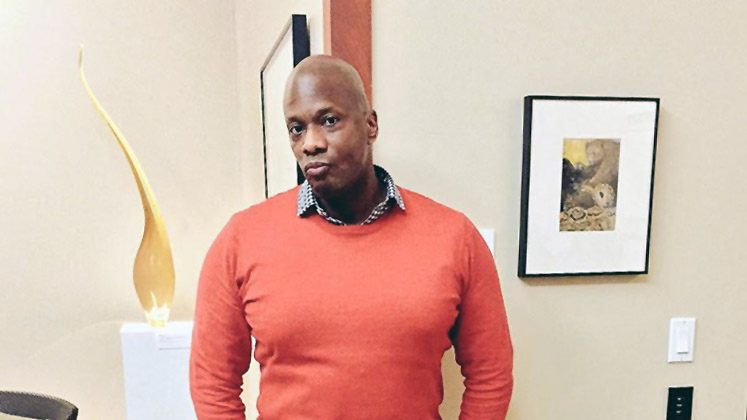Rod McCullom has learned many lessons throughout his journalism career, but he says one of the most important came from the late David Gay — an old mentor from his time at NBC Chicago, and one of the few other Black faces in what was a mostly White newsroom. “He told me to always work with the best,” McCullom said, “and he told me to find something difficult to specialize in.”
That was more than two decades ago. In the years that followed, McCullom would take Gay’s advice to heart, eventually leaving behind the bustle of broadcast newsrooms to strike out on his own, initially as a freelance health reporter. He quickly filled his portfolio with clips from outlets like The Atlantic, Scientific American, and The Nation. His lifelong passion for science and technology subjects helped him develop a reputation for sophisticated reporting on complex issues like addiction and HIV/AIDS — far from “easy A” subject matter.
In 2015, McCullom spent a year at MIT as a Knight Science Journalism Fellow, where he broadened his reporting interests to include topics like biometrics, cognitive science, AI, and the science of crime and violence. This year, as the Covid-19 pandemic brought health disparities to the fore and police killings sparked a summer of racial reckoning, McCullom’s reporting has taken on even greater relevance. In a recent interview, he spoke with me about the importance of finding the right beat, and having the courage to stand out from the crowd. (The following interview has been edited for length and clarity.)
R. M. Davis: You’ve built an impressive freelance career covering what at first blush seem like some very disparate topics — from AI technology to medicine to the science of violence and trauma. How do you think about your reporting beat, and how did your personal and professional experiences lead you to these topics?
Rod McCullom: I’ve always been interested in science and technology. When I worked in television, I was often a producer on health and technology stories, because other people in the newsroom didn’t understand them. I became fascinated by the question of why racial disparities were coming up in all these different stories — breast cancer mortality, cell phone usage uptake, things like that.
Over the years, I started to see that there were scientific reasons for these disparities, and I began to look at research that tried to explain or at least investigate them. Eventually, that led me to branch out into topics like biometrics and AI, trauma and violence, medicine, health, and technology. I’m always looking for research and stories that center on racial disparities, and I try to amplify the research and the stories that are already out there, because I don’t see a lot of people reporting on them.
RMD: Reading your work, it’s clear that you almost always try to bring an intersectional perspective to your storytelling, often using the lens of race or poverty to examine issues in science and technology. Why is that a priority for you?
RM: I think an intersectional framework can only make a story more interesting and more robust. For example, earlier this year I wrote a story on racial disparities in the Covid-19 pandemic. I started writing it around March or April when we were first getting into pandemic mode here in the U.S. At the time, the guidance from the Centers for Disease Control and Prevention was that if you thought you had Covid, you weren’t supposed to go to the hospital and you weren’t supposed to ask for a test. You were supposed to call your doctor.
I remember hearing that on television, and I immediately knew it would be a problem because a very large percentage of African Americans do not have personal physicians. You see similar numbers for Latinos as well, and maybe even higher among other groups like Native Americans. Obviously I’m a Black man, and I have many other identities as well. I just feel that having that intersectional background, having those lived experiences, gives me a vantage point into research and reporting that many other people don’t have. I feel it’s only a positive—that it makes my work distinctive.
RMD: How does one know when they’ve found the right beat?
RM: I think it takes people a while. Sometimes you can find these things early in life. Sometimes you discover it later. It’s like finding that perfect sweater where every time you put it on, it just feels good. It fits right, you know?
It’s important to choose something that you’re passionate about—something that you either understand or that you’re willing to learn about. You also shouldn’t be afraid to be different. That’s what will make you distinctive and make your work stand out. You’ll become an authority on certain matters. If there’s a story, or if there’s a research pipeline that you’ve been following for months or years, you’ll do a much better job on it than someone who just dives right in.
I think the fear of being different is an issue for many writers and journalists; they’re afraid to move out of the pack. They start writing think pieces because everyone else is writing think pieces. They start pitching Bluetooth stories because everyone else is writing Bluetooth stories. I’ve learned that it’s better to stand out of the pack, to carve out a distinctive beat for yourself and not be distracted by what others are doing.
RMD: But it takes a certain amount of courage to do that, to stand apart from the pack. How have you found that courage? Is it just part and parcel of who you are, or is it a quality that you’ve developed over time?
RM: I think this goes back to what we were discussing earlier, just in terms of my own lived experiences. I dealt with a lot of challenges as a preteen and teenager. There was a lot of stress. There was a lot of physical abuse, and that made me sort of go into a shell. It also caused a lot of other lingering effects — physical, mental, emotional as well. Of course, as I grew into a young man and learned to stand on my own, I also learned how to address that trauma. A big part of that was learning to have confidence in myself.
That’s really important because I think, as Black people especially, we’re constantly beaten down. We’re beaten down our whole lives. Teachers respond to us differently when we’re little kids. As teenagers, we get stopped by the police. That sort of mistreatment follows you to college experiences, to work experiences. We’re constantly being beaten down, and I had to learn to be proud of who I am. I think for many of us, it takes a long time, but I really am proud of who I am and who I’ve become.
Ultimately, that’s why I’m not afraid to do something different, in terms of my beat. I feel that all my experiences contribute to who I am today, and to my reporting as well. It took me some years to become comfortable with who I am, and comfortable with standing out, so I deliberately do it now. It took me some years to get to that point, but once you have that confidence, it never leaves you.
R.M. Davis is a research associate with the Knight Science Journalism Program and a student at the MIT Graduate Program in Science Writing.
Rod McCullom writes the Convictions column for Undark Magazine.





Leave a Reply